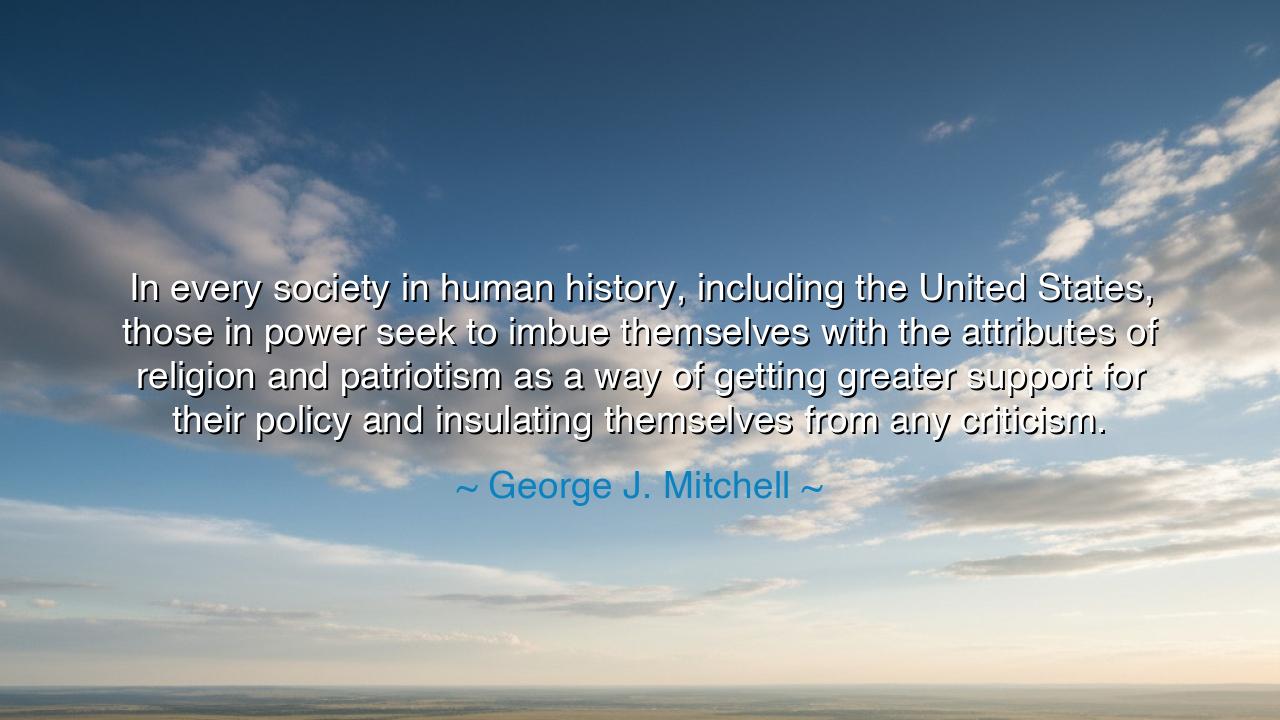
In every society in human history, including the United States
In every society in human history, including the United States, those in power seek to imbue themselves with the attributes of religion and patriotism as a way of getting greater support for their policy and insulating themselves from any criticism.






“In every society in human history, including the United States, those in power seek to imbue themselves with the attributes of religion and patriotism as a way of getting greater support for their policy and insulating themselves from any criticism.” Thus spoke George J. Mitchell, the statesman and peacemaker, whose years in diplomacy taught him the eternal patterns of power and persuasion. His words are not the judgment of a cynic, but the observation of a man who has seen the inner workings of nations — who knows that the forces that move empires are not only armies and gold, but symbols, beliefs, and emotions that bind the hearts of men. This truth, ancient and unchanging, reminds us that power often seeks sanctity, and that rulers, fearing dissent, cloak themselves in the sacred vestments of religion and patriotism to guard their thrones.
When Mitchell speaks of those “in power,” he speaks of all ages — of kings and emperors, presidents and parliaments alike. From the dawn of civilization, the mighty have learned that to rule men, one must also rule their faith and their loyalty. The sword may win battles, but belief wins obedience. Thus, pharaohs declared themselves sons of gods; Roman emperors called themselves divine; and in later centuries, monarchs ruled “by the grace of God.” In every case, power sought legitimacy not from justice, but from heaven itself — for if one’s rule is sanctified by the divine or the sacred flag, then to resist it becomes not merely rebellion, but blasphemy. This, Mitchell warns us, is the oldest shield of tyranny.
The origin of this insight lies not only in history’s grand empires but also in Mitchell’s own witness to politics and war. As a mediator in the Northern Ireland peace process, he saw how deeply religion and nationalism could be intertwined — how sacred symbols could be wielded not for unity, but for division. Yet the pattern he names extends far beyond any one land. In times of fear or crisis, leaders often drape their policies in the banners of patriotism and the language of faith, urging the people to follow not reason, but emotion. Such appeals are powerful, for they speak to what is most intimate in the human spirit — the desire to belong, to believe, to protect what is sacred. But when such devotion is exploited, the light of these virtues becomes the tool of darkness.
History offers countless witnesses to this truth. Consider the fall of ancient Rome, when emperors demanded worship as divine beings to maintain their fragile power. Or recall the Inquisition, when faith — once meant to uplift — was twisted into a weapon of fear. Even in modern times, governments have wrapped injustice in the flag and called it patriotism, silencing dissent by branding it unpatriotic. During the McCarthy era, men and women who spoke their conscience were accused of betraying their country, though they sought only to preserve its integrity. In all these examples, the pattern is the same: the powerful hide behind holiness, turning noble virtues into armor against accountability.
Yet Mitchell’s words are not meant to condemn faith or love of country — far from it. Rather, he warns us to discern between sincerity and manipulation, between leaders who serve the sacred and those who exploit it. True religion humbles power; false religion exalts it. True patriotism defends justice; false patriotism demands silence. When a ruler or politician calls upon the name of God or the flag, the wise citizen must listen not to their words but to their deeds. Do they use the sacred to unite and uplift — or to divide and suppress? This is the test by which all authority must be measured.
This truth calls us to vigilance, for the temptation Mitchell describes is eternal. The human heart craves reverence, and those who seek power know how to awaken it. It is easy to follow the voice that calls our nation holy, our cause righteous, our leader chosen. But the ancients knew what modernity forgets: that virtue without questioning is servitude, and devotion without reason becomes idolatry. As the Greek philosopher Pericles once said, “We do not think that words are an injury to deeds; we are free to praise or to blame.” True democracy — like true faith — is not silenced by reverence; it is strengthened by truth.
Therefore, let Mitchell’s words be a lantern to those who would live wisely in the public life of their age. Question what is exalted, and do not mistake sanctity for righteousness, nor loyalty for blind obedience. Love your nation, but love truth more. Honor your faith, but let it guide conscience, not submission. The greatest service a citizen can offer their country is not unthinking praise, but vigilant integrity.
For as George J. Mitchell reminds us, power forever seeks the shelter of holiness and the warmth of the flag — but it is the duty of free souls to ensure that such symbols serve justice, not conceal it. Let the people, then, keep their eyes clear and their hearts steadfast, knowing that the strength of a nation does not lie in the divinity of its rulers or the sanctity of its slogans, but in the courage of its citizens to see truth even when it is cloaked in reverence.






AAdministratorAdministrator
Welcome, honored guests. Please leave a comment, we will respond soon